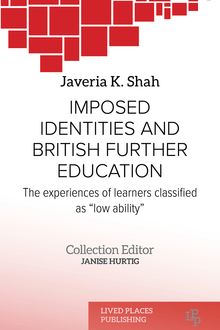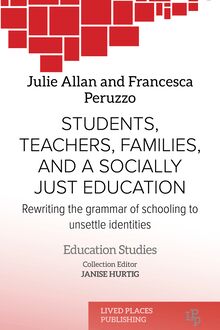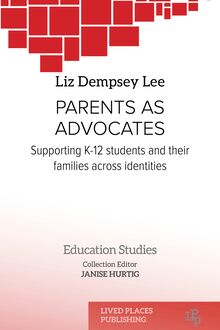-
 Univers
Univers
-
 Ebooks
Ebooks
-
 Livres audio
Livres audio
-
 Presse
Presse
-
 Podcasts
Podcasts
-
 BD
BD
-
 Documents
Documents
-
- Cours
- Révisions
- Ressources pédagogiques
- Sciences de l’éducation
- Manuels scolaires
- Langues
- Travaux de classe
- Annales de BEP
- Etudes supérieures
- Maternelle et primaire
- Fiches de lecture
- Orientation scolaire
- Méthodologie
- Corrigés de devoir
- Annales d’examens et concours
- Annales du bac
- Annales du brevet
- Rapports de stage
La lecture à portée de main
Vous pourrez modifier la taille du texte de cet ouvrage
Découvre YouScribe en t'inscrivant gratuitement
Je m'inscrisStudents, Teachers, Families, and a Socially Just Education , livre ebook
Découvre YouScribe en t'inscrivant gratuitement
Je m'inscrisEn savoir plus
Vous pourrez modifier la taille du texte de cet ouvrage
En savoir plus

Description
One size does not fit all when it comes to education.
In modern society, education has been and continues to be shaped, informed, and driven by a so-called “grammar of schooling”: an approach which completely ignores the many and diverse identities that learners own, are given, and encounter. Categorising students into neat, labelled boxes, splintering knowledge into strictly defined subjects, and fracturing learning – this grammar of schooling desperately needs rewriting.
Through narratives from teachers, students, and their families, this book explores the lived experiences of those who are forced to live with the current approach, and the consequences for their lives, relationship, and education. It also asks the question of what creative and holistic alternative approaches might look like – when the rules aren’t working, the rulebook can be rewritten.
Learning objectives
1: Schooling, technologies and equity in times of crisis
2: The repetition of the grammar of schooling
3: Rewriting the grammar of schooling
4: Unsettling identities for a socially just inclusion?
Sujets
Informations
| Publié par | Lived Places Publishing |
| Date de parution | 22 avril 2023 |
| Nombre de lectures | 0 |
| EAN13 | 9781915271761 |
| Langue | English |
Informations légales : prix de location à la page 0,1250€. Cette information est donnée uniquement à titre indicatif conformément à la législation en vigueur.
Extrait
Students, teachers, families, and a socially just education
Professor Julie Allan
and Dr Francesca Peruzzo
Students, teachers, families, and a socially just education
Rewriting the Grammar of Schooling to
Unsettle Identities
The Education
Studies Collection
Collection Editor
Dr Janise Hurtig
First published in 2023 by Lived Places Publishing.
All rights reserved. No part of this publication may be reproduced, stored in a retrieval system, or transmitted in any form or by any means, electronic, mechanical, photocopying, recording or otherwise, without prior permission in writing from the publisher.
The authors and editors have made every effort to ensure the accuracy of information contained in this publication, but assume no responsibility for any errors, inaccuracies, inconsistencies and omissions. Likewise, every effort has been made to contact copyright holders. If any copyright material has been reproduced unwittingly and without permission the Publisher will gladly receive information enabling them to rectify any error or omission in subsequent editions.
Copyright © 2023 Lived Places Publishing
British Library Cataloguing in Publication Data
A CIP record for this book is available from the British Library
ISBN: 9781915271754 (pbk)
ISBN: 9781915271778 (ePDF)
ISBN: 9781915271761 (ePUB)
The right of Julie Allan and Francesca Peruzzo to be identified as the Authors of this work has been asserted by them in accordance with the Copyright, Design and Patents Act 1988.
Cover design by Fiachra McCarthy
Book design by Rachel Trolove of Twin Trail Design
Typeset by Newgen Publishing UK
Lived Places Publishing
Long Island
New York 11789
www.livedplacespublishing.com
Abstract
Education has been and continues to be shaped, informed, and driven by a so-called “grammar of schooling”: an approach which completely ignores the many and diverse identities that learners own, are given, and encounter. Categorising students into neat, labelled boxes; splintering knowledge into strictly defined subjects; and fracturing learning – this grammar of schooling desperately needs rewriting.
Through narratives from teachers, students, and students’
families, this book explores the lived experiences of those who are forced to live with the current approach, and the consequences for their lives, relationships, and education. It also asks the question of what creative and holistic alternative approaches might look like.
Keywords
Diversity; equity; equality; inclusion; DEIB; social identity; lived experience; learning; creativity; accessibility
Contents
Learning objectives
viii Chapter 1 Schooling, technologies, and equity
in times of crisis
1 Chapter 2 The repetition of the grammar of schooling
27 Chapter 3 Rewriting the grammar of schooling
61 Chapter 4 Unsettling identities for a socially
just inclusion? 95
References 122
Index 145
Learning objectives
1. To recognise the value of the lived experiences of education professionals.
2. To understand the idea of the “grammar of schooling” and its historical origins.
3. To recognise the impact of global dynamics on local realities.
4. To appreciate the impact of the COVID-19 pandemic, particularly on disadvantaged groups.
5. To understand the role of technologies in inclusive education.
6. To become aware of the possibilities for challenging the grammar of schooling.
1 Schooling, technologies,
and equity in times
of crisis
The secret wish of us all, what we think about all the time, is when will it end? But it will not end: it is reasonable to see the ongoing pandemic as announcing a new era of ecological troubles.
( Žižek, 2021 , p. 12)
The impact of the COVID-19 pandemic has been, without doubt, a global catastrophe, “upending the lives of children and families” ( UNICEF, 2020a ) and providing an “existential threat to humanity and an equitable world” ( Bardosh et al., 2019 , p. 14). The pandemic has widened the gap between those already disadvantaged and others and created a “double jeopardy” ( UNICEF, 2020b ) for children living in poverty. It has also exposed some new, highly disadvantaged groups, including migrant workers, whom Stein, Latour, and Schultz (2019 , p. 224) describe as part of the “geo-social classes”. Žižek (2021 , p. 20) points out that “this new working class was here all along, the pandemic just propelled it into visibility”.
Education faced, as a result of the pandemic , “an emergency of unprecedented scale” ( Reuge et al., 2021 , p. 2). Schools were plunged into crisis mode, forced to close with little notice, and required to redirect and recreate learning for their students at home. According to UNICEF (2021 ), schools across the world were closed between March 2020 and February 2021 for an average of 95 instruction days, amounting to roughly half of what children should have had. Countries in Latin America and the Caribbean had the greatest number of closures (losing 158 days of instruction), followed by South Asian countries (closed for 146 days), and countries in Eastern and Southern Africa (with an average of 101 days of closure). UNICEF (2021) estimates that 214 million students globally have missed at least three quarters of classroom instruction time, with 168 million children from 14 countries missing almost all instruction time because of school closures .
Everyone will have their own story of where they were when they learned that we were entering a pandemic and about to go into lockdown. In the interests of stimulating readers to reflect on their own experiences, we recall ours. Julie was in the last few months as Head of the School of Education at the University of Birmingham in the UK as the news from the senior leaders at the regular Monday morning meetings was becoming increasingly bleak. We were being advised to prepare for imminent closure and to make arrangements for the conversion to online learning . Expert colleagues from the medical school added their gloomy prognoses and confirmed that the pandemic was going to be “catastrophic”. Despite the consensus, Julie still couldn’t quite believe that this was going to happen and as she relayed the news to the senior leaders in the School of Education, their reactions suggested they didn’t quite believe it – or her – either. That was soon to change.
Francesca had recently finished her doctorate at the University College London, Institute of Education in London. Eager to contribute to make higher education a more inclusive and socially just institution for disabled students and for students from minority backgrounds, at the time, she was working as a special educational needs tutor for a local charity while publishing from her doctoral thesis and engaging with disabled student activists to bring change in higher education institutions in the UK. She remembers being on a bus on her way to the local charity when the lockdown was announced. Her thoughts went straight to her students, many of whom had multiple impairments and developmental disabilities who came from challenging family backgrounds. She wondered how the situation would impact their lives and education.
The COVID-19 pandemic has, without doubt, provoked a crisis in education, as elsewhere in public life. However, as many educationists and observers have been arguing for several years, education was in crisis long before the pandemic hit. Arendt (2006), for example, highlights the harm done to children by education through its failure to secure the vital conditions necessary for growth and development. Others ( Ball and Collet-Sabé, 2021 ; Ladson-Billings, 2021 ; Darling-Hammond, 2001 ) have drawn attention to the huge and growing inequities, especially for minority ethnic groups , produced within a system that insists that “everyone do better than everyone else” ( McDermott, 1993 , p. 274).
This book is both a response to the COVID-19 pandemic , which of course remains with us, and to the wider, and more enduring, crisis in education. By sharing the lived experiences of professionals − through the pandemic and in their careers more generally − we uncover how specific educational spaces (the school and, during the pandemic, the home) are encountered and lived. We also, in turn, consider how these experiences shape individuals’ identities . We reflect critically on how, within these educational spaces, some of the less educational aspects of schooling − what has been referred to as the “grammar of schooling ” ( Tyack and Tobin, 1994 , p. 453; Zhao, 2020 , p. 198) − are repeated, leading to the “repetition of exclusion ” ( Allan, 2006 , p. 121):
The grammar of schooling , such as standardized organizational practices in dividing time and space , classifying students and allocating them to classrooms, and splintering knowledge into ‘subjects’, is so powerful that it has persisted despite many repeated challenges by very courageous, intelligent, and powerful innovators. It has persisted despite mounting evidence and widespread acknowledgement that it is obsolete and does not serve our children well.
( Zhao, 2020 , p. 198)
In spite of the persistence of the grammar of schooling , which is revealed through the professionals ’ lived experiences , this is, nevertheless, an optimistic and hopeful book, and we also demonstrate, through the professionals, the possibilities for rewriting the grammar of schooling. We turn now to describe the project within which we obtained the lived experiences that we report in this book.
Lived DIGITAL experiences
The research that informs this book took place within a year-long project entitled DIGITAL (Diversifying Inclusion and Growth: Inclusive Technologies for Accessible Learning) in a time of Coronavirus. We investigated the role of digital and non-digital technologies in promoting inclusive practices during the COVID-19 pandemic response of countries in the Global North and South. Data were obtained through interviews with educators, teache
-
 Univers
Univers
-
 Ebooks
Ebooks
-
 Livres audio
Livres audio
-
 Presse
Presse
-
 Podcasts
Podcasts
-
 BD
BD
-
 Documents
Documents
-
Jeunesse
-
Littérature
-
Ressources professionnelles
-
Santé et bien-être
-
Savoirs
-
Education
-
Loisirs et hobbies
-
Art, musique et cinéma
-
Actualité et débat de société
-
Jeunesse
-
Littérature
-
Ressources professionnelles
-
Santé et bien-être
-
Savoirs
-
Education
-
Loisirs et hobbies
-
Art, musique et cinéma
-
Actualité et débat de société
-
Actualités
-
Lifestyle
-
Presse jeunesse
-
Presse professionnelle
-
Pratique
-
Presse sportive
-
Presse internationale
-
Culture & Médias
-
Action et Aventures
-
Science-fiction et Fantasy
-
Société
-
Jeunesse
-
Littérature
-
Ressources professionnelles
-
Santé et bien-être
-
Savoirs
-
Education
-
Loisirs et hobbies
-
Art, musique et cinéma
-
Actualité et débat de société
- Cours
- Révisions
- Ressources pédagogiques
- Sciences de l’éducation
- Manuels scolaires
- Langues
- Travaux de classe
- Annales de BEP
- Etudes supérieures
- Maternelle et primaire
- Fiches de lecture
- Orientation scolaire
- Méthodologie
- Corrigés de devoir
- Annales d’examens et concours
- Annales du bac
- Annales du brevet
- Rapports de stage








